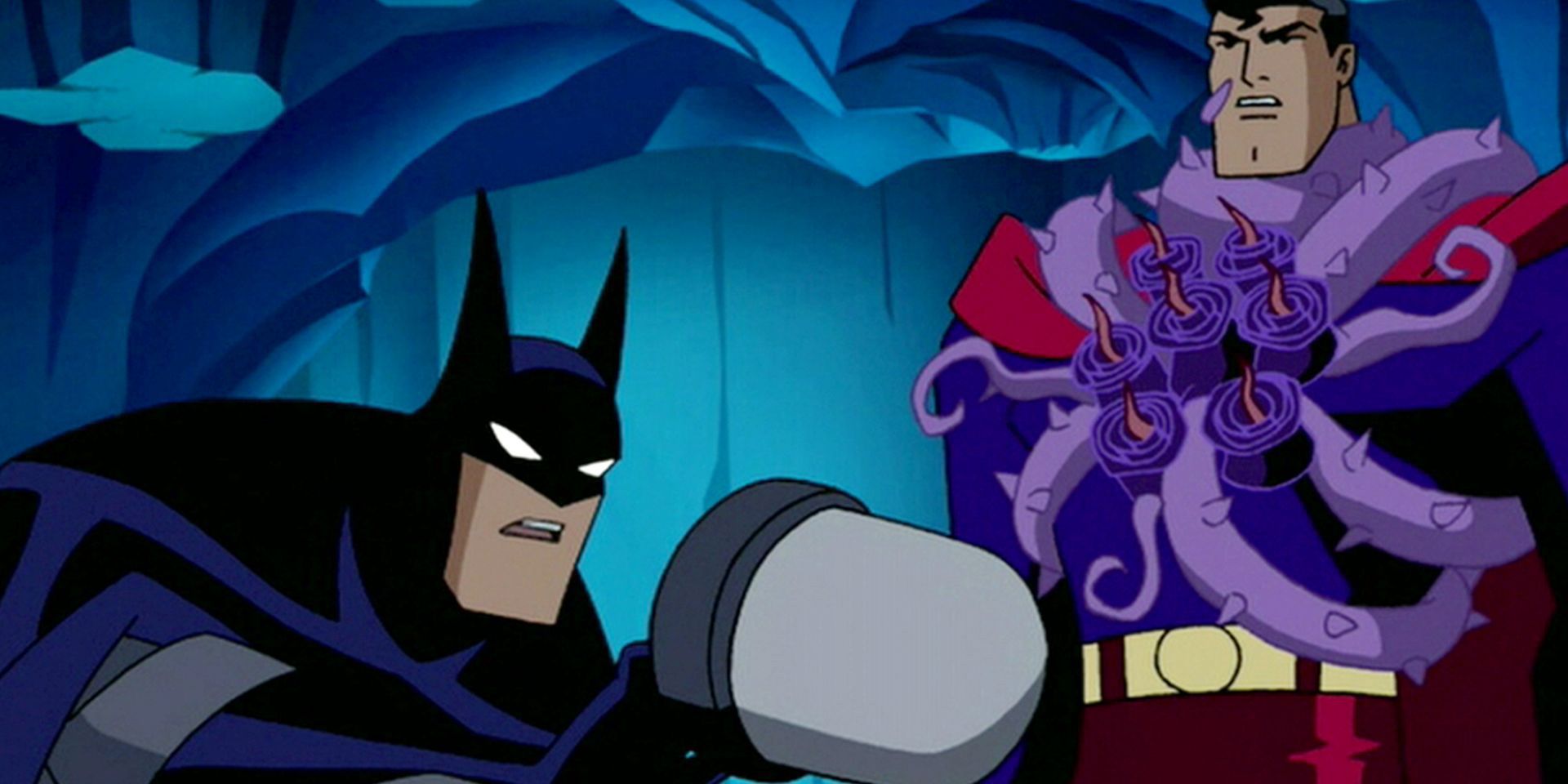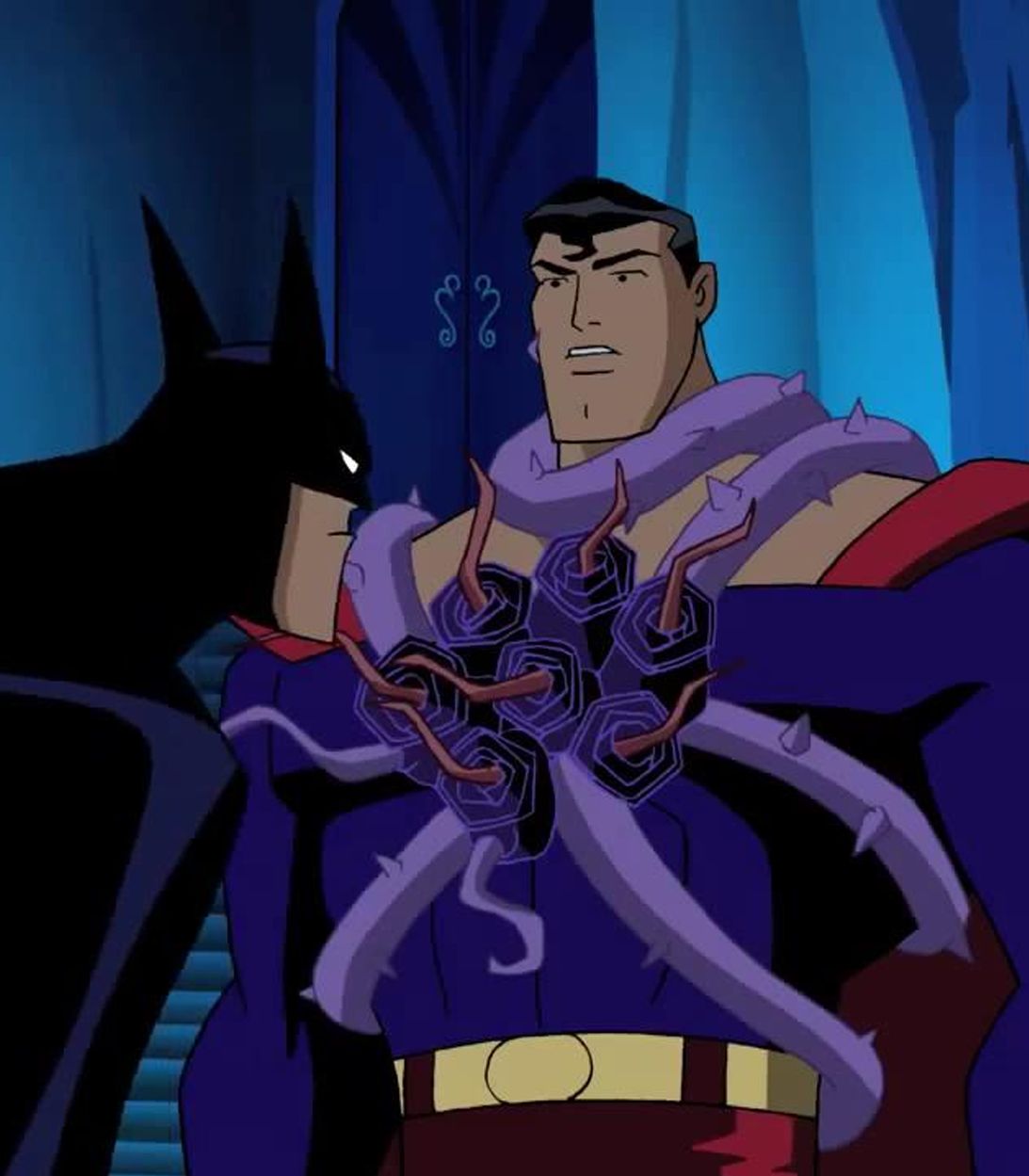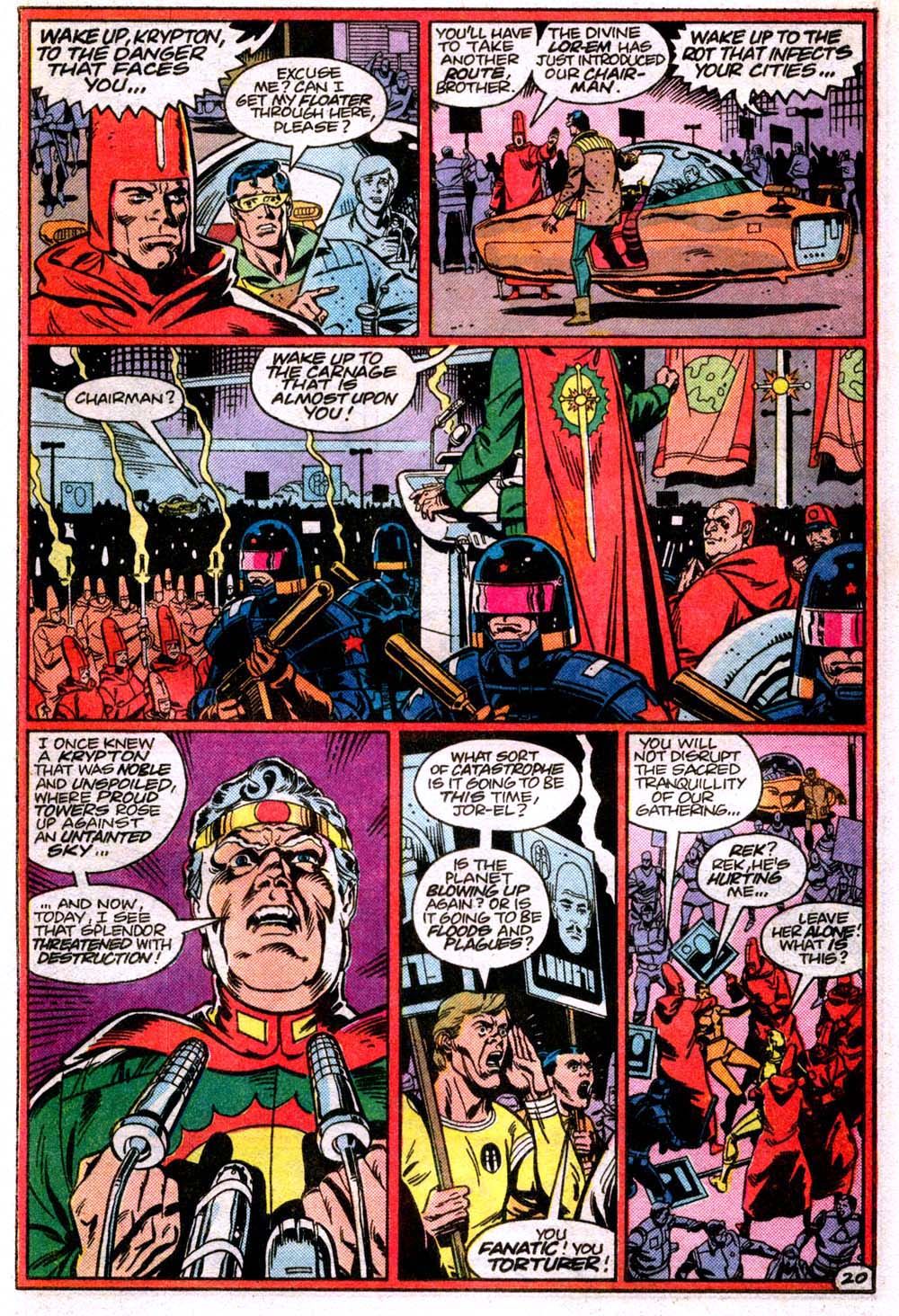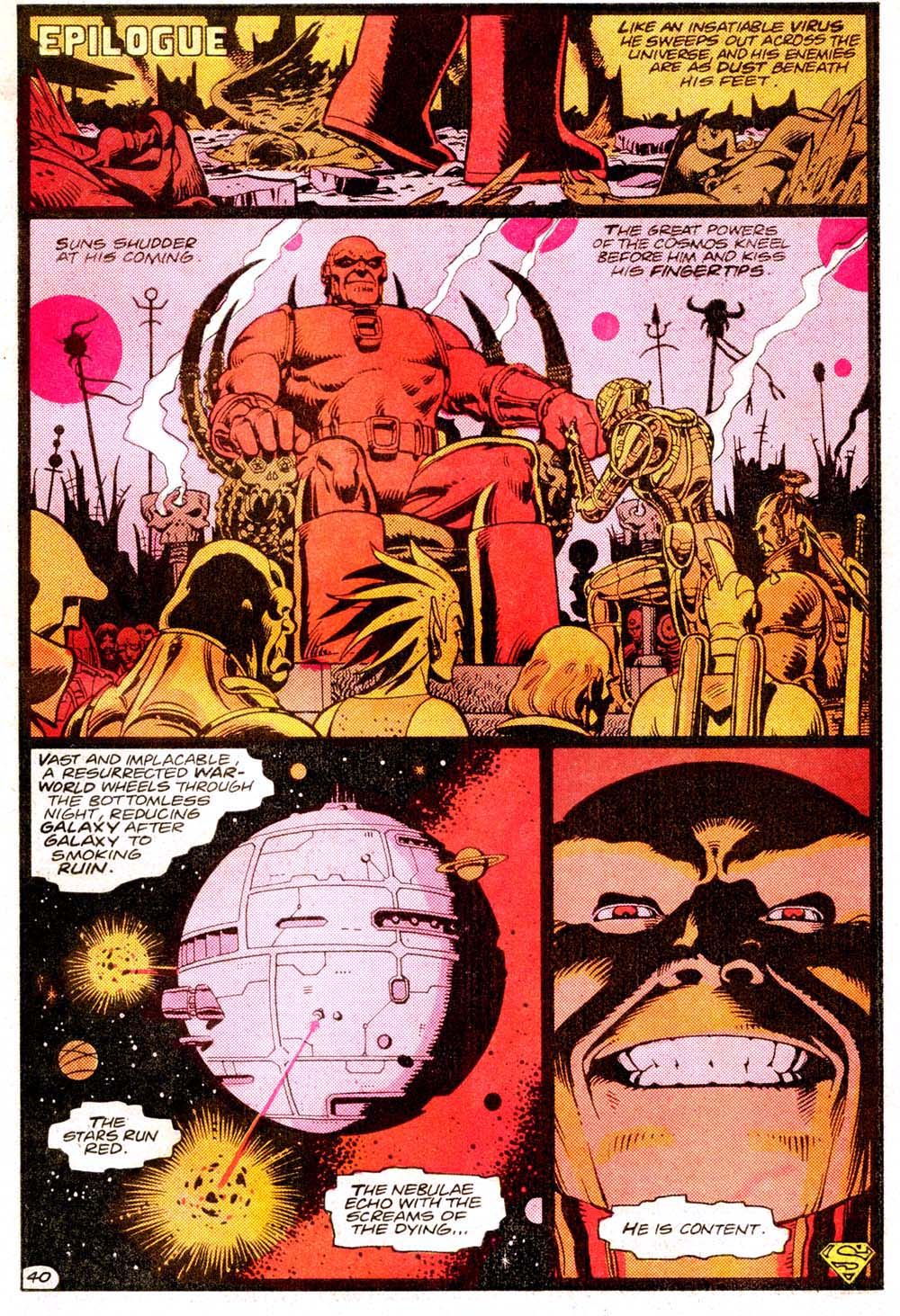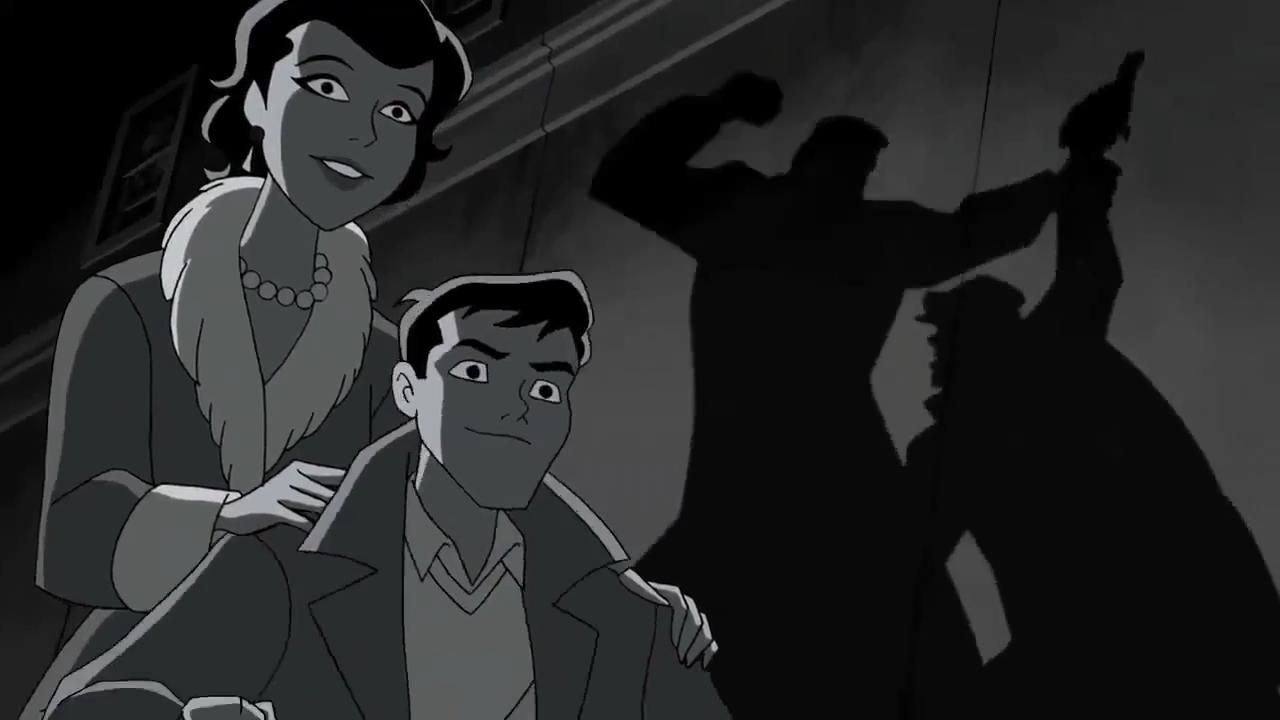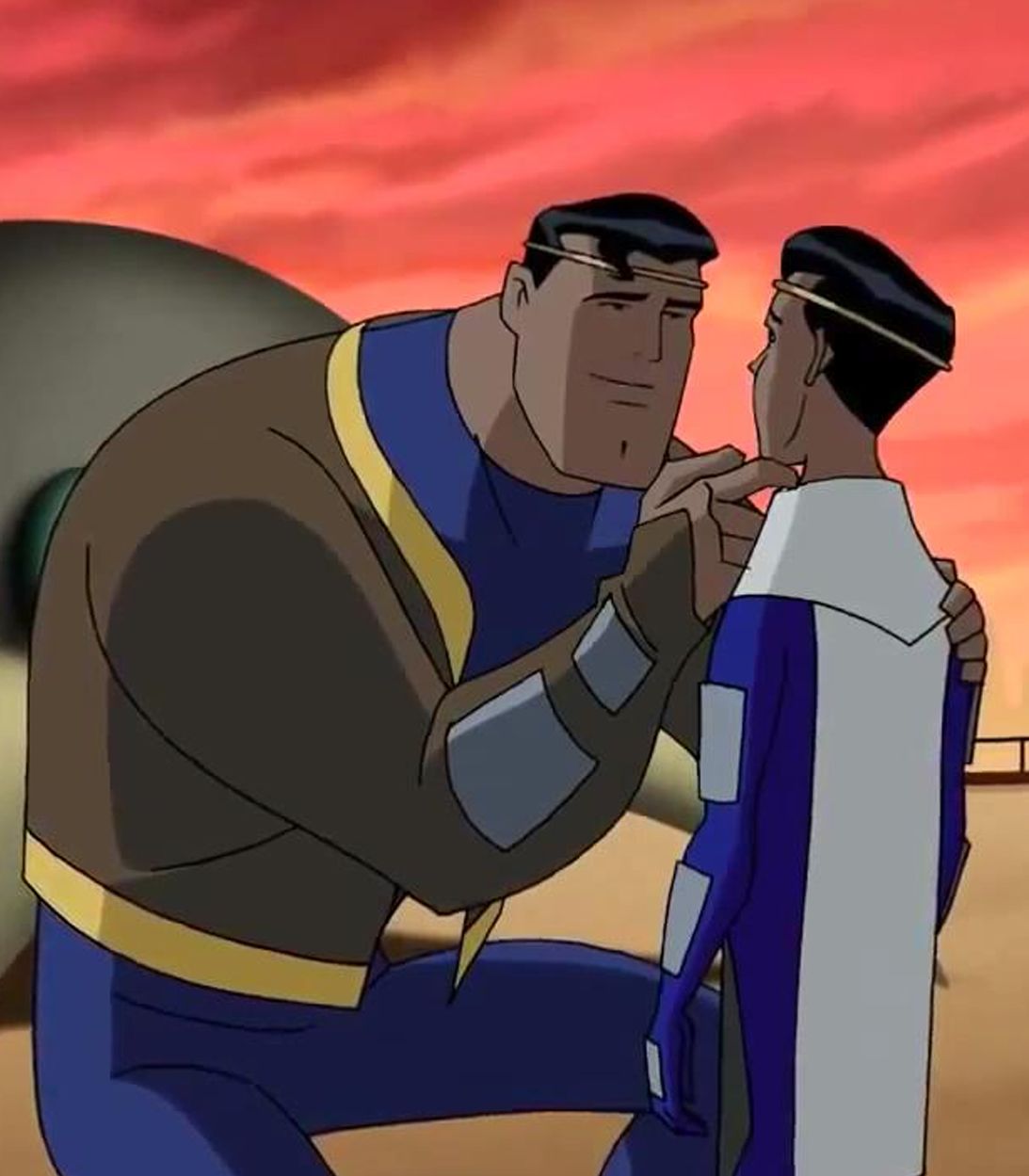Welcome to Adventure(s) Time's 134th installment, a look at animated heroes of the past. This week, one of the very few adaptations of Alan Moore's work to actually feature his name onscreen, which occurred in Justice League Unlimited. And if you have any suggestions for the future, you can find me on Twitter.
Debuting on August 7, 2004, "For The Man Who Has Everything" is the second episode of Justice League Unlimited, adapted from a story with the same title in Superman Annual #11. It's a famous story by writer Alan Moore and artist Dave Gibbons that predates their work together on Watchmen. Moore's disdain for adaptations of his work is well-known, with him demanding his name be removed from the V For Vendetta, Constantine, and Watchmen films.
In this instance, the critical reputation Bruce Timm and his team had garnered over the years apparently gave Moore confidence in their ability to tell this story. Both Moore and Gibbons have a "Based on a story by..." credit in the opening, and Timm has indicated Moore gave the staff his blessing to make changes necessary for an adaptation.
The episode's script comes from J.M. DeMatteis, with direction from DC Animated Universe mainstay Dan Riba, and sticks quite closely to the original story. The comic has a one-page shock opening of Superman living as an adult on the mysteriously vibrant Krypton, while "For The Man Who Has Everything" instead has a quiet intro of Batman and Wonder Woman discussing Superman's birthday as they arrive at his Fortress of Solitude.
The most noticeable change from the comic is the absence of Robin, with many of his bits given to Wonder Woman in "For The Man Who Has Everything." Streamlining the cast makes sense, although it does mean a classic line from the comic is missing -- "Think clean thoughts, chum," Batman says to the adolescent Robin after he meets Wonder Woman (who's not exactly dressed for the weather.)
Most of the beats are the same from here. The heroes discover an immobile Superman with a plant entity attached to his chest. The plant is a "gift" from the alien tyrant Mongul, a "Black Mercy" that provides its victim their hearts' desire, forcing the dreamer to live in the fantasy world. Mongul arrogantly announces himself, and the heroes have to divide their time between physically attacking him and attempting to wake Superman from his dream world.
One subplot sequence is cut from "For The Man Who Has Everything," depicting political unrest on Krypton that also involves his father Jor-El and cousin Kara. In Justice League Unlimited, Krypton society is stable, following Jor-El's inaccurate (and embarrassing) prediction of impending calamity thirty years earlier. Superman lives as Kal-El, a farmer with a wife, son, and puppy the boy can't seem to clean up after. It's not a perfect life, but it's a believably good one. The producers were careful to make Superman's dream world not overly saccharine following fan complaints about Martian Manhunter's idealized domestic fantasy in a previous Justice League episode.
Another deviation has Kal-El's wife Lyla Ler-Rol (a play on the Silver Age character Lyla Lerrol, a famous Kryptonian actress) replaced with Loana, an amalgam of his earthly loves Lois Lane and Lana Lang. And while the animated version of Krypton isn't under threat from a fascist takeover, this version does experience periodic earthquakes. In actuality, it's Superman subconsciously processing the raucous battle occurring nearby.
The action is intense, even before the Black Mercy is removed from Superman, freeing him to aggressively lash out at Mongul. The plant immediately latches on to Batman, creating the most detailed accounting of his origin story in this canon so far. The fantasy version deviates when his father retaliates against the mugger who's cornered the Waynes outside of a certain movie theater. The show utilizes its own continuity well here, as Batman's budding love interest Wonder Woman is the one who enables him to escape Black Mercy's influence.
Both versions of the story have Superman pausing before delivering a fatal blow to Mongul, as his eyes connect with the statues of his Kryptonian parents. The pause gives Mongul a moment to retaliate, but the day is saved when Wonder Woman tosses the Black Mercy at Mongul.
The heroes regroup, as Wonder Woman gives Superman his present, a new breed of rose named after his planet. Superman accepts it, swearing to his parents' image he'll never forget Krypton. A comatose Mongul remains in the background. They question just what he's experiencing, as the camera pans to a close-up, and cries of war and agony close out "For The Man Who Has Everything." Mongul's eerily content, but empty, smile is an invention of the adaptation.
It's a disturbing ending, one that sets the tone for the increasingly dangerous world of the show. Interestingly, the comic provides a more detailed vision of Mongul's fantasy.
DESIGN-Y
Jor-El's design is an intentional callback to Superman's design in the first Justice League season. Bruce Timm altered Superman's look to add extra lines to his face, hoping to create a chiseled and rugged look. Instead, fans complained he just looked old. The extra lines were dropped after the first season, and Timm brought back the "old" Superman face for his father this episode.
Mongul's design has been tweaked since his last appearance. His silver bands are now black, and his costume is a darker shade of purple. Interestingly, the animators can't seem to decide how many fingers Mongul has. During his Justice League debut, he consistently had three digits and a thumb. Here, that's the case in a few shots, but in most angles, he seems to be rendered with four digits and a thumb.
CONTINUITY NOTES
Wonder Woman's invisible plane debuts in this episode. A proposed direct-to-video film, called Justice League: Worlds Collide (set between the end of Justice League and the first episode of Unlimited) was going to tell is origin, but the film never happened. Dwayne McDuffie's script was later repurposed for the non-DCAU canon Justice League: Crisis On Two Earths DTV, where we discover it's Owlman's jet set on a cloaking mode.
Joe Chill makes his only animated DCAU appearance here. He's voiced by Kevin Conroy, Batman himself! Conroy has also voiced Thomas Wayne on a few occasions (including this episode), making him both the murderer and the victim. It's also possible having Batman's voice appear in Joe Chill's mouth indicates Batman's subconscious belief he's responsible for his parents' death.
Robin isn't in the adaptation thanks to Warner Bros.' "Bat-embargo," which prevented any elements from the Batman canon -- aside from Batman -- from appearing on Justice League Unlimited. The Robin of the comics at the time was Jason Todd, of course, who we believed at the time didn't exist in the DCAU.
"Um, ACTUALLY..."
Another character omitted from the adaptation is Kal-El's daughter, Orna. Moore and Gibbons' Kal-El is also a scientist, while he's a farmer here (a nod towards the influence of the Kents.)
The adaptation has Wonder Woman's present as the new flower "Krypton," while Batman gifts cash. Moore and Gibbons' story had Batman presenting the new breed of flower and Wonder Woman giving Superman a reproduction of the bottled city Kandor, unaware he already had one.
HEY, I KNOW THAT VOICE
Loana is appropriately voiced by Dana Delany, the voice of Lois Lane on Superman: The Animated Series. M*A*S*H star Mike Farrell, originally Jonathan Kent, also returns to voice Jor-El (indicating how Superman has mentally merged his two father figures.) Farrell is also uncredited as the harmless fantasy version of Brainiac. Eric Roberts, on the verge of a career resurgence at the time, is absolutely menacing as Mongul.
APPROVED BY BROADCAST STANDARDS & PRACTICES
Wonder Woman's curse at Mongul in the comic ("Go to hell!") is interrupted by the blast of the weapon she's picked up, obscuring the final word here.
"I GIVE YOU...OBLIVION."
It's undeniable elements of the original story have been simplified, but only the most dogged of purists would complain. DeMatteis is famous for co-writing a far more lighthearted era of Justice League comics, but he's just as adept at drama. Streamlining the fantasy world of Krypton, cleaning it up into a sci-fi version of a Midwesterner's ideal homelife, makes Superman's loss even more tragic. George Newbern also deserves praise for his performance as Superman here. Once deemed too stiff for the role by fans, he delivers a genuinely touching goodbye to a son he knows can't exist, as his dream world literally falls apart around him.
This could be the most violent episode of the show's run, yet the intensity feels earned. Superman's been wronged in an unspeakable way, and his aggressive assault on Mongul feels less like gratuitous action, and more like a deserved emotional release. Even then, the audience is reminded of Superman's heroic nature. It's a vision of his parents that snaps him out of his rage, a reminder of the tragedy he's already endured and his promise to live in a way that makes them proud. It's a far more sophisticated view of the character than we've seen in any of the live-action films, and another example of why this canon is still viewed with such esteem.

